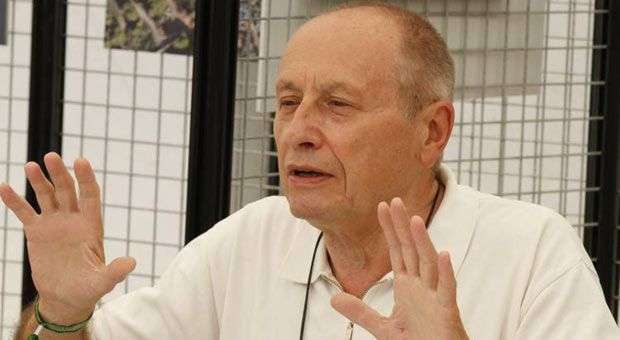Bernard Cassen-director of Le Monde Diplomatique for over three decades (1973-2008) – participated in the Festival of Radio and Television that ran from September 9 through the 13. This Parisian, born in 1937, was previously in Havana in December 2012, invited by the XXXIV International Festival of New Latin American Cinema. For decades in Cuba he has been known for his journalism, for his intellectual work related to the study of globalization as a phenomenon and, above all, for being one of the managers of the World Social Forum.
In principle, it is difficult to find the relationship between the honorary president of ATTAC (Association for the Taxation of Financial Transactions for the Aid of Citizens) and a space for debate on television on the island, especially if you take a look at ambitious agenda the theme of the event, which approached from the realtion of this media means with the digital world to the study of the soap operas-considered by the organizers “Latin American cultural heritage” -, through the practices of publics, gender violence , the programming view from social research, as well as another great set of topics with varying interconnection with the theme: social Impact of the Public Television and Radio.
“It is not that I’m a specialist in the subject,” Bernard Cassen confessed to OnCuba and explained that, despite this, he was interested to come to exchange with Cuban experts on some crossroads to those found on public television today.
“One of the key points I try to to develop is that we can not confuse with Public Broadcasting with the State or Government Television. They are two totally different things. “
“I understand that the offensive against private media is a great temptation to use public media as a party media. But in the medium term that is suicide. “
For the secretary general of the Association Mémoire des Luttes, “not to establish a kind of public media structure that guarantees pluralism, access for all, is a dangerous gamble, a mortgage. Doing so is a guarantee of stability, an investment for the future. “
In arguing this position, he recalls the results of the most recent presidential election in Venezuela: “Did you see the results of the choice of Maduro? He won with a very slim majority, 1.5%. It was forecasted a 10% advantage. I was in Caracas that night. “
According Cassen, it was expected around 6 pm that the candidate Nicolas Maduro, Venezuela’s current president-to win with a margin of ten percent, but as time went on, the margin was narrowing progressively “six, four , two … finally he won. But he could have lost and none of them had a plan B; what would have happened if they lost the elections, particularly in terms of public media? “.
“In Venezuela, more than in other countries, there is a real media war. Almost all of the private media is against the Bolivarian Revolution. These means were extensively involved in the 2002 coup. But if you lose the election, you also lose control over public channels. Should Henrique Capriles have won, he had had control over all private media and all public! They never came up with the idea that they could lose, but what if? They didn’t think about it. “
Another aspect of the matter to bear in mind is that even when in power control information is done with more or less intensity, “people are informed because there are now a multitude of sources, there is the Internet, and there is a problem: youngsters, say 13 to 25 years are turning off the television to spend more time at the computer, Smartphone or tablet, and make up their own menu. In other words, this process is completely individualized. “
Sure, “these are young in a very advanced country like France” and Cassen acknowledges it, “but the trend will be that. This means that public media can exist in a vacuum. It’s a waste of money, right? “.
“Added to this is the fact, very strong in France, for example, a strong distrust of journalists, the credibility of the journalist in France is very low. All this poses a problem for public radio and television: who’s listening? “.
“In France many public television programs are almost similar to those of private broadcasters by seeking publicity. Then, the specificity of public service is decreasing more and more, to the point that some of the right advocates privatizing public channels “.
The news programs produced by public broadcasters are in a constant and fierce competition “because one can choose from 200 television channels. Then, the public companies can win only if you have a quality product. “Maybe that’s why, in many cases the leaders focus their attention on such spaces and Cassen draws attention to what for him is a fact: it is not news or news programs that most directly affect the imagination and spirituality of the public, but the entertainment programs.
“The ideological weight is much stronger, much more. But the leaders do not realize that the most important are those entertainment programs, which must have quality and be popular at the same time. “These programs, he says, “need funding and overall creative atmosphere.”
Conclusions like this, coinciding with the French journalist’s opinion, have been championed by Cuban critics and viewers and specialists since some time ago discussions around this topic have become more force in Cuban society. How to do it today, remains a mystery to almost everyone in some way or another relate to the sector. Also for Cassen, who stated: “It is a tremendous challenge and I don’t have the answer.”
In contrast, he foresees some ways out: “You need capable, inventive, creative people, with humanistic culture, environmental criticism and without self-censorship, to win a battle that can be easily lost.”
And to finish, he states: “I believe that the issue of program quality and freedom of expression are the biggest challenge with public broadcasters and this deserves a reflection of the leaders. I do not know if everyone realizes this. “










